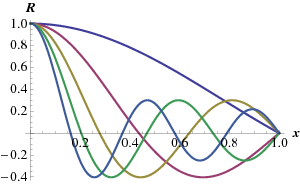10.7: Our Initial Problem and Bessel Functions
( \newcommand{\kernel}{\mathrm{null}\,}\)
We started the discussion from the problem of the temperature on a circular disk, solved in polar coordinates, Since the initial conditions do not depend on ϕ, we expect the solution to be radially symmetric as well, u(ρ,t), which satisfies the equation
∂u∂t=k[∂2u∂ρ2+1ρ∂u∂ρ],u(c,t)=0,u(ρ,0)=f(ρ).
With u(ρ,t)=R(ρ)T(t) we found the equations
ρ2R″+ρR′+λρ2R=0R(c)=0T′+λkT=0.
The equation for R is clearly self-adjoint, it can be written as
[ρR′]′+λρR=0
So how does the equation for R relate to Bessel’s equation? Let us make the change of variables x=√λρ. We find
ddρ=√λddx,
and we can remove a common factor √λ to obtain (X(x)=R(ρ))
[xX′]′+xX=0,
which is Bessel’s equation of order 0, i.e.,
R(ρ)=J0(ρ√λ).
The boundary condition R(c)=0 shows that c√λn=xn,
where xn are the points where J0(x)=0. We thus conclude Rn(ρ)=J0(ρ√λn). the first five solutions Rn (for c=1) are shown in Fig. 10.7.1.

From Sturm-Liouville theory we conclude that
∫∞0ρdρRn(ρ)Rm(ρ)=0if n≠m.
Together with the solution for the T equation,
Tn(t)=exp(−λnkt)
we find a Fourier-Bessel series type solution
u(ρ,t)=∞∑n=1AnJ0(ρ√λn)exp(−λnkt),
with λn=(xn/c)2.
In order to understand how to determine the coefficients An from the initial condition u(ρ,0)=f(ρ) we need to study Fourier-Bessel series in a little more detail.


